- Home
- Sarah Hall
How to Paint a Dead Man
How to Paint a Dead Man Read online
How to Paint a Dead Man
Sarah Hall
For Jake
‘Things are not what they are, they are what they become.’
GASTON BACHELARD
Contents
Epigraph
The Mirror Crisis
Translated from the Bottle Journals
The Fool on the Hill
The Divine Vision of Annette Tambroni
The Mirror Crisis
Translated from the Bottle Journals
The Fool on the Hill
The Divine Vision of Annette Tambroni
The Mirror Crisis
Translated from the Bottle Journals
The Fool on the Hill
The Divine Vision of Annette Tambroni
The Mirror Crisis
Translated from the Bottle Journals
The Fool on the Hill
The Divine Vision of Annette Tambroni
The Mirror Crisis
Translated from the Bottle Journals
The Fool on the Hill
The Divine Vision of Annette Tambroni
The Mirror Crisis
Translated from the Bottle Journals
The Fool on the Hill
The Divine Vision of Annette Tambroni
The Mirror Crisis
Translated from the Bottle Journals
The Fool on the Hill
The Divine Vision of Annette Tambroni
Translated from the Bottle Journals
The Fool on the Hill
The Mirror Crisis
The Divine Vision of Annette Tambroni
The Fool on the Hill
Translated from the Bottle Journals
The Mirror Crisis
How to Paint a Dead Man
Acknowledgements
About the Author
Praise
Other Books by Sarah Hall
Credits
Copyright
About the Publisher
The Mirror Crisis
You aren’t feeling like yourself. You haven’t been feeling like yourself for a while now, not since the accident. More accurately, not since the moment you heard about it. That morning, that minute, holding the phone to your ear and hearing your father say those horrific words; it was then you felt the change, then when you were knocked out of kilter. You’re not sure what’s wrong exactly; it’s hard to put your finger on, hard to articulate. It isn’t grief. Grief would be simple. Something internal, something integral, has shifted. You feel lost from yourself. No. Absent. You feel absent. It’s like looking into a mirror and seeing no familiar reflection, no one you recognise hosted within the glass.
You’re not crazy. You must emphasise this point and remind yourself of it. You are not crazy. And you’re not being coy, or difficult. This isn’t about fashionable social detachment, the current trend for woe-is-me, or wanting to be the cool detached outsider. You can’t quite catch sight of yourself as you go about your life, that’s all. Your body doesn’t contain its spirit, just as the mirror has relinquished your portrait. You are elsewhere.
You used to feel something similar as a child, but it was less empty, less lonely then. Your brother was the same. The pair of you had a peculiar sense of each other, not as separate people but as doppelgängers, symmetries, which is quite common in twins of course. You weren’t formed from a separated egg-you weren’t identical, not a common gender, John and Jack, or Ruth and Rita. Still, there you were, together, from the very beginning. You linked fingers in the womb. You shared a pillow of placenta, pedalled in tandem against your mother’s belly. You heard concurrently the wet chamber music of her body, shared nutrients, and dreamt the same hermetic dream. After you were born, pink then blue, you then Danny, your existences were still pegged closely together, like your newborn hats on the washing line.
Later, it was as if you were sitting with him on the sofa, at his exact coordinates, when really you were sitting opposite him at the table, making potato prints with your mum. Sometimes you felt you were more at his location than you were at yours. Ulterior proximity, it’s called. When you waved it wasn’t to your brother, it was to yourself. Nobody ever worked that out, not even your mum, who said, Wave to Danny again, sweetheart, he’s waving back. You were placed in separate cribs, but the heat of him still kept you warm at night. He still tugged the blanket away from your cheek when he tucked it up under his own. At least, that’s how it felt.
Inevitably, you learned to talk. This is when things got tricky. You developed a method of speaking on behalf of the displaced you. It was logical, in a way. At first they thought you were speaking on behalf of your brother, as bossy, older siblings often do. You want juice please, you said, and they gave it to Danny in his chewed sippy-mug. And would you like some juice too, Suzie-Sue, they crooned. Such an adorable bond, people said. So unusual. There were lots of baby photographs taken with you looking quizzical, frowning at items around the room or at the adults posing with you. Your brother was quiet, quieter than you, and always smiling, as if he knew a secret.
The situation became worrying. Playgroup was a minefield. Nobody could really tell who you were talking about: yourself or Danny. The subjects of your speech were often confused, and you and your brother babbled privately together, making up names for spiders, stomach aches, and rain. You did not make friends with the other children at first; instead the two of you played hoops and balls together and swapped beakers of milk; there was a system of cup colours to be observed. There was talk of educational retardation, developmental limitation, which shocked your mum and dad. There were visits from the healthcare worker, District Nurse Lane. You remember her rigid triangle skirt and her bleached cuticles. She wondered about this inseparability, this double-speak. She wondered if, rather than being delightful, it was abnormal to possess a psychological satellite. She wondered how healthy the relationship really was between Danny and you.
Enter Dr Dixon, at the paediatric clinic in town. Because you seemed to be the one in charge, because the sibling unity was too powerful, you were going to have special lessons with him, to help you ‘be more comfortable’. The building had a brass bell, and an old wooden revolving door wheelchairs couldn’t fit through: the first time you went you watched a girl with callipered legs being lifted up and carried through. It looked as if she were being fed into a giant grinder, and when it was your turn you had to be cajoled and encouraged into the blades. The carpet inside was made of tiny blue plastic threads. After you’d walked across it there was enough static to make a little jolt of electricity crack from your fingertip when you touched the table. There were anti-smoking posters with cloud-skulls floating above people holding cigarettes. Dr Dixon kept a tank of stick insects in his reception for the kids to look at. Sometimes they shed, leaving their skins behind on the aquarium trees where they dried and curled like thin spun toffee. It made you feel queasy to see the brown husks hanging off the forks of bark.
The doctor smelled of pencil shavings and peppermints. He spoke very slowly, very deliberately. His teeth looked white and strong. For a while you thought he was a dentist, but he never asked you to open wide. Instead he held you gently by the shoulders and asked impossible questions. What do you think is the best way to answer this question, Sue? If I took away your mother and father, and then I took away your brother Danny, what would you be called? The last proposition always made you furious, and you scowled yourself into a headache. He asked you to paint pictures of your family. Who do you see here, here and here? You were encouraged to play by yourself each day, without Dan, without dolls, or books. It seemed particularly unkind to your brother, who looked crestfallen whenever your mum said it was time for you to go upstairs for ‘special hour’. Only once did Danny come t
o the clinic. The two of you were put in an observation room and left alone. You endured six months of Dr Dixon. It felt like years. Then the whole thing was over. Only later, when you were a teenager and you asked about those memories, was it described, apologetically, as treatment. Now you can’t pass by the old sandstone clinic at the top end of your hometown without hearing that man’s relentless nasal parroting. Say I do, Sue, say I do, Sue.
But it worked, you suppose. You learned to communicate normally, like the rest of the psychically circumscribed automatons of the world. You looked at yourself in the mirror Dr Dixon gave you to hold. You repeated the words until they stuck. Me, me, me. I, I, I. You wound back into yourself, like the reversing spool on your mum’s sewing machine. You became a separate unit. You were cured.
Now here you are again, dislocated, remote, spilling your essence out into the void.
You’ve been thinking about this. You’ve been wondering if you are really so different from everyone else in the massive, grinding city where you live. You look at the variety of faces opposite you on the bus; listen to the conversations. Everyone seems to be in crisis. You just want to get out of the financial mess, a man in a grey suit says to his black-suited colleague. An oily teenager yells into his mobile phone: You can’t help feeling like a bastard for wanting her to get rid of the thing. She was the one who forgot to take the fucking pill! An Asian woman with a nose piercing softly confides in her friend: You get sick to death of his moods. You want to kill him. You really do.
Nowadays, people often don’t say I, as if they don’t want to be involved in the desperate act of being. No one is contented dwelling inside their existence any more. No one is secure. Identity can be chosen. You can be whoever you want to be, which means you should consider all the options before selecting yourself. People are aware of the heart, slopping about like a piece of lively meat inside the chest, as if it isn’t snug, as if it hasn’t been fitted right. They are constantly told that a better incarnation lies just over the horizon; all it would take to be joined with that preferable version is beauty, money, weight loss, fashion, confidence, talent, surgery, cosmetics, gymnasiums, a cordless drill, a new microwave, more sex.
The ruthless calibration of consumerism. For if this is all you’ve got, this single chance, this brief, blemished simian posing opposite you in the mirror, then hadn’t it better be refined, hadn’t it better be romanticised? The self is no longer made to measure. ‘I’ is simply the wrong size. If only that better, happier edition could be purchased and possessed. But it ghosts around out there, tantalising, beautiful, erstwhile. Meanwhile London is filled with laterals, crowding on to trains and buses, talking different languages, avoiding free newspapers. They tug at their exteriors, wrestle with their features, and recast themselves in conversations. They are trapped inside the dull, deficient hides that Nature has unhelpfully allocated.
You are not yearning for improvement. You don’t want to be reborn from a womb of material idealism. You don’t wish to emerge, perfect and bright, out of the modern western chrysalis. You are not interested in living magnificently and utterly, certain that in this life you have triumphed. All you want is to be yourself again, because the identity that was once yours has vanished. Though a familiar face is reflected in the mirror, its anima is missing. You are absent.
There’s no real mystery of course, no complicated reason. The nub, the crux, the heart of the matter is this: Danny died a month and a half ago. You’ve lived six weeks, fourteen days, and several minutes longer than he.
Translated from the Bottle Journals
Today a journalist from the city came up here and admired the view and asked me why I paint these objects on the table. They are so plain and ordinary, he said. Why do you paint bottles and bottles and bottles? The same painting, over and over. What does it mean? He asked this of me as if it were answerable, as if it were important. And I said to him, I do not paint bottles. The man must have thought me mad or obtuse or cunning perhaps. He will, no doubt, blame the rustication of the place where I live, or my absence from the galleries and salons. He does not see choice. He does not see beyond the quartet of fruit in the dish, such as it is presented-a plum, two apricots and another plum. On the canvas he sees only the surface: the green paint and the grey and the white, which will not pass over a border unless it is directed. He considers quaint the long shadows taught to us by the academies.
To him, the painting on the easel is a funeral. It is careful and uncluttered, and it is not loud enough for him to understand. He does not have the practical training to recognise the discreet layers of vermilion used, their illuminating effect. If he had turned to the west during our conversation, he might have seen the sun setting behind the mountains, he might have seen the radiance of the sky.
But I am not whom he expects, this young traveller with his recording device and his pressed suit. He tells me he is sorry to hear of my ill health. He grieves on behalf of Italy. Then you must have acute indigestion, I said to him, and you will surely need some Averna to restore the balance. I assured him that I am quite well, merely old. I do not know who makes these reports, in which I am lying on my deathbed. Next week, he told me proudly, he is going to Milan to hear Miles Davis play his trumpet. How wonderful, I said. Now he has gone away, back to his apartment in the street with its commotion and motorcars and thin girls selling chips of ice. And he will write in the magazines and tell his friends that I am an artist of great simplicity and a man of great complexity. He will say that I like to make a joke when the issue of mortality is raised, and my body is profoundly stooped, and I show no sign of enlightening the world about the subject of my work. He will say that the paintings have a strange luminosity, but it is meaningless. The meaning is unavailable; it cannot be grasped. And they will photograph these bottles of mine for the exhibition catalogues, and in America I will upset the critics. They will say it is deliberate.
Look, I told the man, look again, because he had driven a long way to get here.
Theresa visits me once a day, sometimes twice if there is a delivery or laundry to be done. She brings my cigarettes, onions and anchovies, the usual things. She will let herself in without knocking and call out because she imagines one variety of noise disturbs me if I am at work in the studio while another does not. In her there is the bustle of the market where she has been shopping. Hurry is in her hands as she turns items over in the sink to rinse off the soap. There are tremors in her flesh from the broom’s short strokes. If asked she will turn the earth and uproot my garlic, some of which I give her to take away. I tell her to step over the basil, not to water it until it has parched completely, though she will often water it. The tomatoes she likes to bring inside, yellow-red, and she puts them in bowls against the walls, like ornaments. The lizards she sweeps into a pan, flicking them outside with broken tails. They scurry back into the house to begin their campaign again. She might think I want to paint her. I do not know her thoughts. In the winter she comes less often. The hill to Serra Partucci is too steep.
I receive other visitors, and more frequently than has been supposed. Antonio has begun keeping tabs on me. He would like me to move to a house less like the house of a peasant; he would prefer me in the apartment on the Via Fondazza in Bologna where he can call round regularly. The journalists are nervous if arriving unannounced. I do not believe it is stealth but perhaps they feel they will catch my true self. Then the enigma will finally be solved. Perhaps they think they will see me wearing a uniform, or performing a curse, or talking to the objects in the studio. They say the unmade roads remind them of the weddings of their cousins. They leave their motorcars down by the cypresses and walk up the slopes. If a bird skull or an iris catches their eye they will always pick it up and arrive holding it like treasure. Nature is found particularly in single objects here, though it is all around. For city dwellers Nature is invisible, located inside the weather brought to their towns, or inside their bodies when they visit the doctor to hear of its errors. To c
ollect bones and items of colour is instinctual. They practise the language of still-life as they approach.
I like to be surprised by visitors though I can often hear the engines labouring and cutting out and the vehicles reversing back to the bottom of the hill, so I am not truly surprised, just anticipating the appearance of a face at the window. I always have the coffee ready to make by the time anyone arrives. Oh, you take honey to sweeten your coffee, they always say, how unusual, is it not unlucky? It is better not to begin debates about the importing of sugar, and from which states, so instead we talk of bees labouring in our golden fields. I put their stems in a basin to keep fresh and I put their bones on the kitchen table. Other times there will be a letter of inquiry first, with particular mention of this composition or that composition, or the old party, or a new theory, and I write back of course, come, but not on Thursday. On Thursday, if I am well, I teach in the local school. Such courtesy is not necessary but I can instruct them not to attempt the hill. If ever a car makes the climb all the way to Serra Partucci then I will be absolutely surprised and I will enjoy asking the driver of such a fine vehicle if they would like some coffee.
My dog Benicio died a year ago in the summer. I miss his warm presence in the house. He was a loyal dog with short brown fur and he was run over and could not be saved. In the afternoons the sun is very strong, I think it blinded him on the road or he was sleeping on the warm dirt. His back legs were injured in a difficult way-they had already been broken once before. I wish in mercy that he had died more quickly. A companionable dog cannot be replaced for many years. I do not need one for hunting or digging for truffles but have always enjoyed the easy fellowship of dogs. In any case there are too few years for another, so I have taken to finding company in other ways, such as the radio and writing. At the house now there is me, an old man who does not paint bottles, the little broken lizards, and Theresa, installing her red tomatoes.

 Sudden Traveler
Sudden Traveler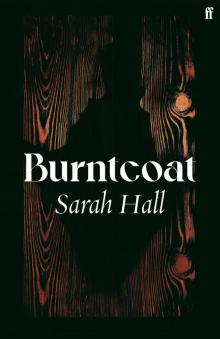 Burntcoat
Burntcoat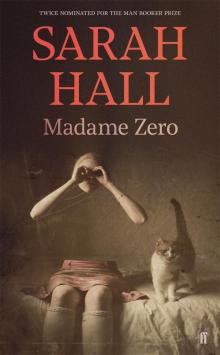 Madame Zero
Madame Zero Mrs Fox
Mrs Fox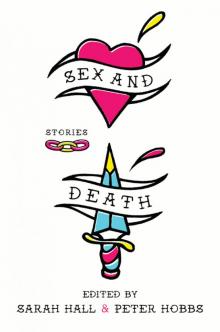 Sex and Death
Sex and Death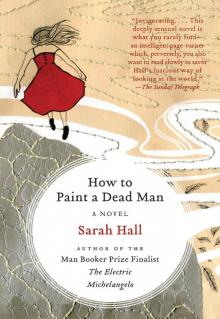 How to Paint a Dead Man
How to Paint a Dead Man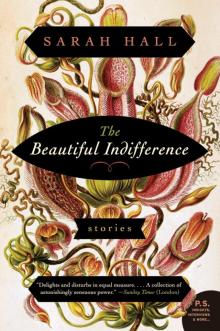 The Beautiful Indifference
The Beautiful Indifference The Wolf Border
The Wolf Border The Electric Michelangelo
The Electric Michelangelo